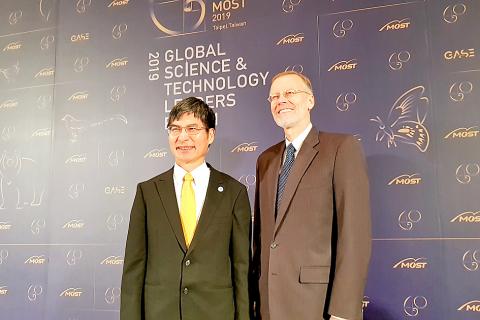The American Institute in Taiwan (AIT) and the French Office in Taipei yesterday expressed their hope to boost ties with Taiwan through technological collaboration and talent cultivation, and both hailed semiconductors and innovation as Taiwan’s strengths.
The two-day Global Science and Technology Leaders Forum, organized by the Ministry of Science and Technology, opened yesterday at the Mandarin Oriental Taipei (文華東方酒店) hotel, and nearly 300 participants from Taiwan and 18 other countries attended.
In a speech, AIT Director Brent Christensen helped mark the ministry’s 60th anniversary, telling the forum that Taiwan is a critical link in global technology supply chains.

Photo: Chien Hui-ju, Taipei Times
Christensen also alerted people to the challenges of the new digital age.
China’s market-distorting subsidies, intellectual property theft and talent poaching threaten a rules-based economic order, he said, calling for closer ties among like-minded partners to push back against Beijing.
The US and Taiwan have launched the Talent Circulation Alliance to facilitate educational and professional exchanges, with a summit scheduled for Tuesday next week, he said.
French Office in Taipei Director Jean-Francois Casabonne-Masonnave said that artificial intelligence (AI), entrepreneurship and talent exchanges are primary opportunities for further France-Taiwan collaboration.
“AI is a priority for our President [Emmanuel Macron] and is a very fertile ground for scientific cooperation between France and Taiwan,” he said, expressing the hope that more Taiwanese students would pursue scientific and engineering training in France.
An example of bilateral collaboration is the Franco-Taiwanese Scientific Grand Prize, which has been awarded annually for more than 20 years, he said, adding that French National Centre for Scientific Research chairman Antoine Petit is expected to visit Taiwan in the spring.
The US remains Taiwan’s primary partner in technological cooperation, and the talent cultivation initiative aims to bring more young people to the international stage, Minister of Science and Technology Chen Liang-gee (陳良基) told reporters.
Taiwan-France collaboration in technology has a history of more than 20 years, while the two nations exchanged six start-up teams this year, Chen said.
The ministry has also established 12 overseas research centers across Southeast Asia, where it is helping countries install disaster prevention systems, he added.
Asked what idea he would share at the forum, Albert Liu (劉峻誠), founder and CEO of Kneron Inc (耐能), one of the developers of Edge AI solutions, said he hopes that the Taiwanese government can relax certain regulations to facilitate AI development.
Many public security and financial systems employ AI, but Taiwan’s relatively conservative regulations in those fields impose barriers on larger-scale innovation, he said, citing the government’s requirement that shareholders provide their identity documents.

NATIONAL SECURITY THREAT: An official said that Guan Guan’s comments had gone beyond the threshold of free speech, as she advocated for the destruction of the ROC China-born media influencer Guan Guan’s (關關) residency permit has been revoked for repeatedly posting pro-China content that threatens national security, the National Immigration Agency said yesterday. Guan Guan has said many controversial things in her videos posted to Douyin (抖音), including “the red flag will soon be painted all over Taiwan” and “Taiwan is an inseparable part of China,” while expressing hope for expedited “reunification.” The agency received multiple reports alleging that Guan Guan had advocated for armed reunification last year. After investigating, the agency last month issued a notice requiring her to appear and account for her actions. Guan Guan appeared as required,

A strong cold air mass is expected to arrive tonight, bringing a change in weather and a drop in temperature, the Central Weather Administration (CWA) said. The coldest time would be early on Thursday morning, with temperatures in some areas dipping as low as 8°C, it said. Daytime highs yesterday were 22°C to 24°C in northern and eastern Taiwan, and about 25°C to 28°C in the central and southern regions, it said. However, nighttime lows would dip to about 15°C to 16°C in central and northern Taiwan as well as the northeast, and 17°C to 19°C elsewhere, it said. Tropical Storm Nokaen, currently

‘NATO-PLUS’: ‘Our strategic partners in the Indo-Pacific are facing increasing aggression by the Chinese Communist Party,’ US Representative Rob Wittman said The US House of Representatives on Monday released its version of the Consolidated Appropriations Act, which includes US$1.15 billion to support security cooperation with Taiwan. The omnibus act, covering US$1.2 trillion of spending, allocates US$1 billion for the Taiwan Security Cooperation Initiative, as well as US$150 million for the replacement of defense articles and reimbursement of defense services provided to Taiwan. The fund allocations were based on the US National Defense Authorization Act for fiscal 2026 that was passed by the US Congress last month and authorized up to US$1 billion to the US Defense Security Cooperation Agency in support of the

PAPERS, PLEASE: The gang exploited the high value of the passports, selling them at inflated prices to Chinese buyers, who would treat them as ‘invisibility cloaks’ The Yilan District Court has handed four members of a syndicate prison terms ranging from one year and two months to two years and two months for their involvement in a scheme to purchase Taiwanese passports and resell them abroad at a massive markup. A Chinese human smuggling syndicate purchased Taiwanese passports through local criminal networks, exploiting the passports’ visa-free travel privileges to turn a profit of more than 20 times the original price, the court said. Such criminal organizations enable people to impersonate Taiwanese when entering and exiting Taiwan and other countries, undermining social order and the credibility of the nation’s